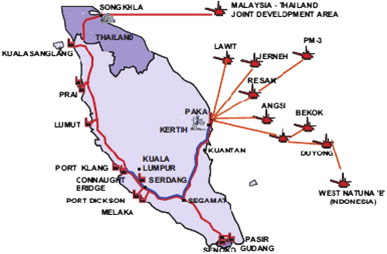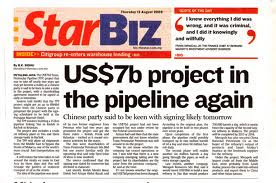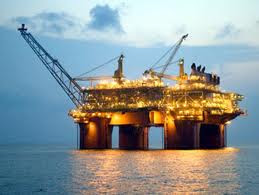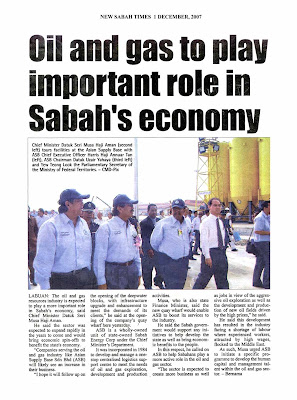 |
| Fallen lower oil pump price billboard |
A very populist statement but how can it be done when the formula in calculating oil prices is dependent on market prices and limited by the amount of subsidy. In his debate with the then Minister of Information, Dato Ahmad Shabery Chik in July 2008, Anwar can only offer a weak explanation of his proposal.
Anwar claimed he can raise RM5 billion additional subsidy by revising the power purchase agreement with Independent Power Producers. He fail to realise that the power purchase rate of operating IPPs he accused as on the high side is now not as profitable and most of the IPPs are operating on a different PPA structure.
Taking away price subsidy to IPPs will only result in higher electricity prices which could counter balance the positive impact of lower fuel prices. Will he then increase subsidy for electricity too?
It only shows the limited understanding of the working of the economy by the claimed graduate in Malay Studies despite being Minister of Finance for 8 years.
Despite his weak argument, Anwar continued without shame to play on the ignorance of people to offer higher royalties to oil producing states. While his man in PAS, Dato Husam Musa carry the same lies in Kelantan to demand for oil royalty.
R demand
Husam Musa is leading the charge with a movement called R which is demanding for oil royalty for Kelantan. In the recent Himpunan Kebangkitan Rakyat at the Merdeka Stadium, R is one of the demanding NGO and was represented in dark maroon color
When the oil royalty demand was initially made few years ago, Husam boldly said that Kelantan will not accept any Compassionate Fund ("Wang Ehsan") but insist on Oil Royalty. On the contrary, Menteri Besar, Dato Nik Aziz was willing to accept Wang Ehsan.
He not only demanded on the Federal Government to pay oil royalties but also claiming in arrears for past off-shore oil production in areas oil royalties or wang ehsan given to the state of Terengganu.
Back in 2010, Husam had the support of Gua Musang "king", the only living lifetime Member of Parliment Tengku Razaleigh Hamzah.
Ku Li said then that Kelantan should not be a beggar and receive wang ehsan. However, he has tone down his position and loosen-up his know it all arrogance as the person involved in drafting the Petroleum Act. .
Now it is on the lips of every political operators that Ku Li arrogantly refused to give Dato Mustapha Mohamed any chance to politely explained when he went to "the White House" to pay respect.
Kelantan does not deserve oil royalty for oil found more than 3 nautical under the Land Code which assigned state sea boundaries to within that distance, except for the states of Sabah and Sarawak which had their own land code before formation of Malaysia.
Husam tried to create a "drama" by bringing the matter to court.
However, he did not honestly reveal that his lawyer, Tommy Thomas was only seeking a judicial interpretation of the agreement between Petronas and Kelantan state with regard to the entitled 5% oil royalty.
Petronas challenged the attempt on the ground that the decision to deny Kelantan oil royalties is not merely based on that agreement lone but include several other agreements and act of law including land code. Thus far, Petronas won at the High Court and Court of Appeal.
Husam then applied to the Federal Court and was granted right to appeal to the Court of Appeal. That is no victory but merely procedural matter. But off course, these clowns made a big brouhaha out of merely an opportunity to appeal.
Thus far, they have no more argument to appeal and will lose.
Bachok oil landing
Knowing well they do not have any glimpse of hope to substantiate their claim, the Royalti Minyak came up with a new excuse to keep the issue relevant by applying political pressure and also campaiging to deny Dato Dr Awang Adek attempt to recapture the Bachok Parliamentary seat.
They demanded on Awang Adek for oil from the joint production are between Malaysia and Thailand to land at Bachok.
Too late, it was already agreed that the landing will be at Songkhla and the Kelantan government has only themselves to be blamed.
When various initiatives like the development of Easy-West Landbridge in late 90s and Trans Malaysia USD7 billion peninsular pipeline few years ago, Kelantan government refused to cooperate and made bizarre unreasonable demands.
The adversarial attitude of the state government did not give confidence to both Thailand and Petronas.
Kelantan can give whatever reason but politically, the survival of PAS in Kelantan is dependent on keeping the people ignorant and the state under developed. PAS traditional supporters in Kelantan are the rural population and it is to their advantage to maintain Kelantan's hinterland as rural.
Dispell the notion that PAS in Kelantan is about religious struggle. That is more relevant for Terengganu or Kedah. In Kelantan, it is more about the economic class confrontation.
Other stunts
Dato Najib has every reason to ignore this demand and his basis are legitimate but out of his good hearted nature, he had request a study be done to look into the matter. Husam exploited this announcement to peddle around in Kelantan that his legally defeated claim has legitimacy.
At the tabling of the last state budget, Husam presented a surplus forecasted budget by imputing expected oil royalty in the budget as another of his oil royalty demand wayang.
He has done demonstrations, convoys, open prayers, etc till the crowd has dwindled in numbers.
In his latest stunt, Husam claimed that there is oil reserve in Kota Baru town and Sinar Harian obligingly went along with the circus.
He made a false claim that the state will negotiate with various parties to explore the potential oil reserves.
A lie to the rakyat.
Any minerals found below a certain feet under comes under the power of the Federal government. For oil, only Petronas can explore the oil and negotiate with other parties.
In the first place, there is no reason for Kelantan to negotiate with other parties because the production sharing agreement of Petronas made by the late Tun Abdul Razak was the best deal in market.
The urban legend is that during negotiation, there was a contract to end his life so that his successor can agree to a more relaxed term. Stuff for a good conspiracy action movie.
That was Husam's attempt to excite the Kelantan voters with his stunt to keep his long and already tiring campaign alive. However, he forgot that someone kept a copy of his own writing in a 1992 Harakah.
It only shows he understand the issues and law on oil but merely playing dumb now for politics sake.
Anwar false promise
While Husam is at it in his demand of oil royalty, Anwar is promising all the oil producing states particlarly Terengganu, Sabah, Sarawak and soon to be Pahang royalty of 20%.
Off the cuff, anyone with some knowledge of economy and industry would expect that it is too high and not economically viable. But the problem is that it requires a lengthy explanation.
However, we see this promise as Anwar trying to undermine Petronas by going direct to foreign oil companies. This is what the seven sisters wanted back in the 70s.
Anyway, that is a lengthy story of geo-global politics and deceit and treachery of international oil companies and their backing superpower.
Member for Parliament for Kota Belud, Dato Abdul Rahman Dahalan wrote a well written posting in his blog here to explain why Anwar's 20% oil royalty offering is not viable.
We reproduced part of his posting below:
AN OVERVIEW
The petroleum business is not a business arrangement for the Average Joe. The capital outlay, technical challenges and financial risks are so great and prohibitive that only the companies which have specialized expertise and bottomless bank accounts normally dare enough to go into it.
Imagine trying to lower drilling pipes, 4.5km from the sea level, in an intensely-pressurized environment to search for the elusive black gold. It requires special and extremely expensive equipment and expertise which only the world’s oil major players (the likes of Shell, Murphy Oil, ExxonMobil, etc) possess. The cost of exploration drilling could run into hundreds of millions of dollars which would go to absolute waste should no oil be found in vicinity of choice.
The nation’s oil company, Petronas, like her counterparts in other developing countries (Indonesia, Venezuela and Nigeria etc), does not have the capacity to absorb the financial risk mentioned above.
It is not financially equipped to spend billions on research and development and take on the financial risks in the exploration and production phases when the same billions are very much needed to be spent on the country’s development.
In addition, unlike Petronas - which primarily operates within Malaysia’s waters - the oil majors enjoy economies of scale. They operate all over the world which helps to defray the costs of R&D, the exploration and production phases.
In the event that oil is actually discovered, the capital that needs to be spent in the subsequent phases is even more substantial. It is reportedly said that the cost of the oil production phase could reach as much as RM2 billion. Sometimes even more.
To cushion such uncertainties and spread the financial risk, Petronas enters into a joint-venture agreement (known in the industry as Production Sharing Contract or PSC and later, a variant called RSCs or Risk Sharing Contracts) with multinational oil companies like Shell, Murphy Oil or ExxonMobil and others.
These giant oil companies are given a percentage of the oil revenue generated in return of them bearing the financial risk and sharing technologies worth billions in Research & Development.
PETRONAS TAKES ALL?
The opposition always paint the perception that Petronas has been unfairly profiting from Sabah’s oil revenue, so according to them, it is only right for Petronas to give 15% extra oil royalty to Sabah.
Can it be done? Is it even doable? Let’s explore the realities.
While the following example will not be able to capture every essence of all the JV partnerships Petronas entered into, none the less, it is suffice to give a fair view of what the realities are on the ground.
The illustrations below explain how much Petronas makes from Sabah oil.
For every RM100 revenue derived from Sabah oil, 5% goes to the state’s coffer while another 5% to the Federal coffer. Approximately 45% goes into recovery cost, and the remaining 45% goes to the joint venture’s gross profit.
This option is plausible given the fact he has never given any assurances publically that he would not cut Sabah’s federal allocation which, at the moment, is one of the highest among all the states in Malaysia.
Apparently, keeping Malaysians in the dark makes the illusion easier to perform. In fact, I remember asking opposition members, including Anwar Ibrahim himself, in Parliament of the specifics but instead of an answer, I got a blank response followed by sharp stares!
Contrary to lies spawned by the opposition, the federal government actually spent more (by a whopping RM4.736 billion) in Sabah in 2011 compared to what it collected in the same year!
Statistics, in the end, don't lie.
Bear in mind that Anwar had made lots of promises and judging from the Buku Jingga, the federal budget will be bloated by an additional RM200 billion within a year. His only source is cutting wastage which is not a source of revenue one can show in the projection.
One has to spend first and cut a certain amount assumed as wastage to generate revenue.
Sabah has a future top develop the state with recent new oil findings. Do not waste it with changing in mid stream.
Off course, it is a popular promise to lower pump prices, give the state more revenue and maybe have the oil landing at Bachok and oil exploration support industry in Kelantan.
Will the PAS people be willing to see development and come development, their rural power base weakened?







.jpg)








